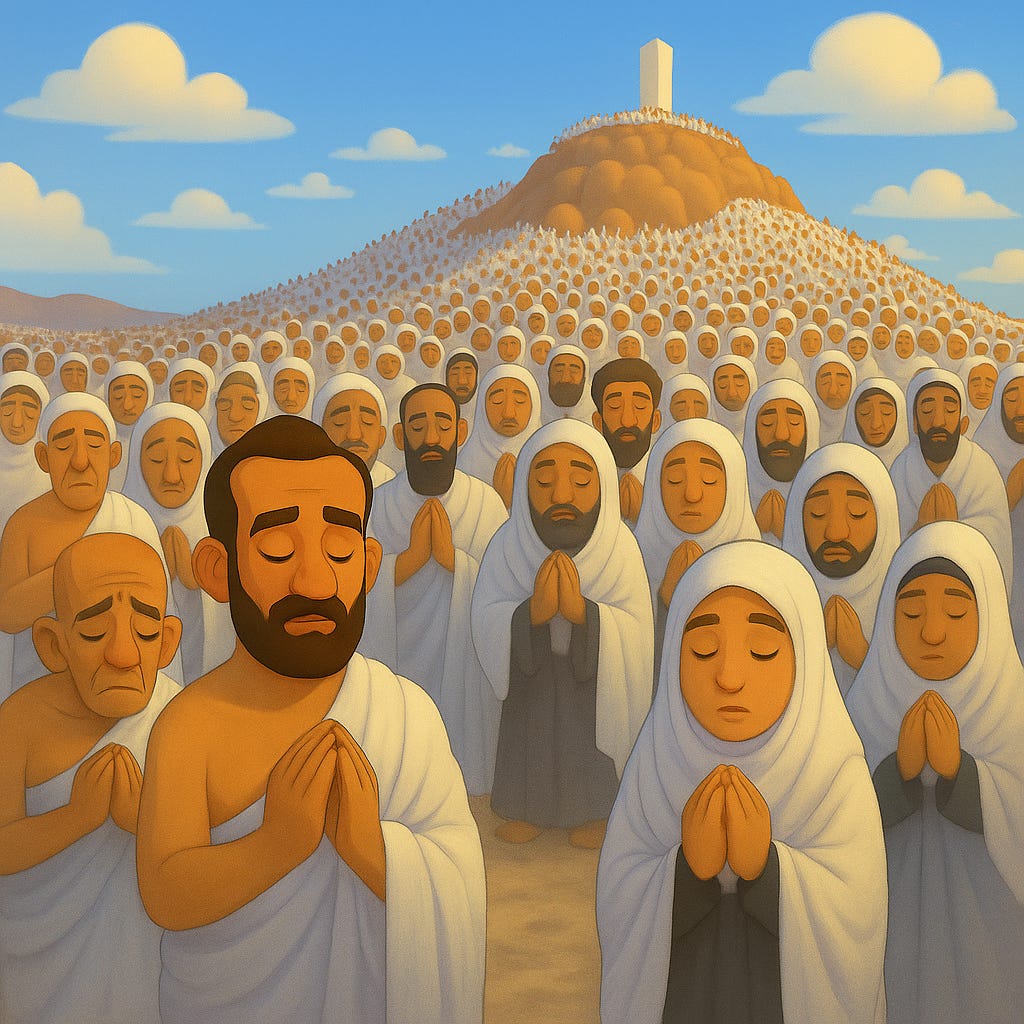What Hajj Teaches Us About Unity, Humility, and the Awakening of the Ummah
Every year, for over fourteen centuries, something extraordinary happens.
From the deserts of Africa to the mountains of Central Asia, from skyscrapers in Kuala Lumpur to villages in the Sahel, millions of Muslims drop everything—status, profession, wealth, comfort—and converge upon a single place: Makkah. They gather not for a festival, a protest, or a trade fair. They gather for Hajj.
And it is unlike anything else on Earth.
You will find there billionaires standing next to barefoot farmers. University professors walking beside shepherds. CEOs lining up behind janitors. Everyone clothed in the same simple ihram—two unstitched white cloths. No designer brands. No business cards. No private jets. Just dust on their faces, gravel beneath their feet, and prayers in their hearts.
In Arafah, they stand on open plains where the Prophet Muhammad PBUH once stood and delivered his farewell sermon. No walls, no roofs, no stages. Just sky for a ceiling and earth for a mat. And they weep. And they pray. And they remember.
For those hours, the world as we know it pauses. The labels we carry—engineer, founder, vendor, investor—mean nothing. The currencies we hoard have no value. The passports we flash disappear. We become what we truly are: servants of Allah, equal in dignity, united in purpose.
This is not just a ritual. It is a revelation.
The Ritual of Revolution
Hajj is not merely a journey of the body. It is a shaking of the soul. It is the only worship in Islam that can only be done collectively, globally, and in unison. While prayer, fasting, and charity can be done privately or locally, Hajj forces us into proximity with the Ummah.
You feel it when you're trying to find your place in the tawaf around the Kaaba. You feel it when you share a tent in Mina. You feel it when you're shoulder to shoulder in Muzdalifah, trying to rest your body while keeping your heart awake.
But what truly elevates Hajj is not the crowd—it’s the clarity. That in the grand scheme of things, our degrees, our devices, our dividends... they dissolve. What remains is taqwa—God-consciousness—and the relationships we build with one another through mercy, patience, and shared struggle.
Hajj is the Blueprint of the Ummah
This is the Ummah as it was meant to be.
One without borders.
One without racism.
One without classism.
One where the billionaire from Dubai and the bricklayer from Dakar break bread from the same pot, bow in the same direction, and plead to the same Lord.
And that, precisely, is what inspires UMMAH—not just as a name, but as a mission.
If Hajj shows us what the Ummah looks like at its spiritual best, then our daily economic, social, and professional lives should strive to reflect that unity. Because the Hajj is not meant to stay in Makkah. It’s meant to travel back with us. Into our boardrooms. Into our startups. Into our factories. Into our WhatsApp groups and supply chains and zakat funds.
It is there that we must translate the spirit of Hajj into systems.
From Worship to Work
The people you meet at Hajj will likely never sit beside you again. But the feeling—that everyone is your brother, that everyone is your sister—that can become your daily mindset. That humility, that sincerity, that yearning to serve, should not expire when your flight home lands.
Imagine if our professional lives were built around the values of Hajj:
Fairness in transactions
Compassion in leadership
Generosity in success
Dignity in labor
This is why UMMAH was created: to take the oneness we taste at Hajj and turn it into economic cooperation, mentorship, trade, innovation, and social progress. Because we don’t just want to pray together once a year. We want to build together every day.
We want Muslim entrepreneurs and professionals to realize that their work—when aligned with sincerity, justice, and unity—is ibadah. We want businesses that reflect the equality of Arafah. We want platforms that allow the doctor in Istanbul to mentor the student in Jakarta. We want capital to flow with purpose, across borders, just like pilgrims flow around the Kaaba.
Because if Hajj is our highest expression of unity, then unity in our daily dealings must be our highest ambition.
From Makkah to the Marketplace
The Prophet Muhammad PBUH said, “There is no virtue of an Arab over a non-Arab, or of a white over a black, except by taqwa.” And that message—spoken on the plains of Arafah 1,400 years ago—is still the most revolutionary message on Earth.
And perhaps, as we look to revive the Ummah—not just in heart, but in habit—we must keep our eyes on those dusty plains. Not just for what they require of us, but for what they reveal about us.
That we are one.
That we are equal.
That we are capable of greatness—when we remember who we serve.
May every Hajj inspire a hundred partnerships.
May every tawaf inspire a thousand transactions rooted in trust.
May every Arafah inspire a new awakening.
This is what we carry at UMMAH.
Not just the memory of Hajj.
But its mission.
This article was written based on original concepts and structure by the author. Generative AI was used to assist with elaboration, refinement, and image.


